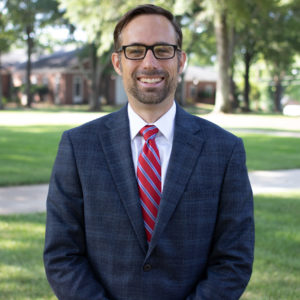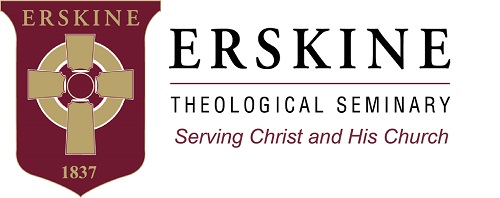Martha Margaret Cotten, left, celebrates with the graduates and their families. Graduates, their families, and…

Forming Students in the Image of Christ
 The Christian life is about formation—formation into the image of Jesus Christ for the glory of God and the good of the world (Gen. 1:28, 12:2–3; Matt. 28:18–20; 1 Cor. 10:31, 15:49; 2 Cor. 3:18; Eph. 4:11–16; Col. 3:10). And I believe the goal of all educative endeavors in the Church center on this formation toward individual and communal maturity in Jesus Christ. As Paul says: “He is the one we proclaim, admonishing and teaching everyone with all wisdom, so that we may present everyone fully mature in Christ.” (Col. 1:28). This sums up the necessary core of any seminary education worthy of the name “Christian.”
The Christian life is about formation—formation into the image of Jesus Christ for the glory of God and the good of the world (Gen. 1:28, 12:2–3; Matt. 28:18–20; 1 Cor. 10:31, 15:49; 2 Cor. 3:18; Eph. 4:11–16; Col. 3:10). And I believe the goal of all educative endeavors in the Church center on this formation toward individual and communal maturity in Jesus Christ. As Paul says: “He is the one we proclaim, admonishing and teaching everyone with all wisdom, so that we may present everyone fully mature in Christ.” (Col. 1:28). This sums up the necessary core of any seminary education worthy of the name “Christian.”
Through their teaching, lifestyle, and convictions, seminary professors form students toward some vision of maturity in Christ. As students experience formation, they will spread that formation in their churches. And as those churches experience formation, they will spread that formation in their families, workplaces, and communities. Therefore, seminary educators bear a profound responsibility to get formation right. While seminaries traditionally excel at providing biblical and theological knowledge, unless this intellectual formation finds integration across their whole lives, then students’ experience in seminary might actually be deformative. Thus, I’m convinced that seminaries need to aim at whole-person formation, which is the kind of seminarian formation we are seeking to cultivate at Erskine Theological Seminary.
Four Dimensions
It is helpful to conceive of whole-person formation in four dimensions: theological, personal, spiritual, and ministerial formation. However, seminaries must hold these dimensions together in an integrated whole in order to aim at whole-person formation. Let’s consider each of these.
- Theological Formation
Theological or intellectual formation is typically what we think a seminary education offers students. Professors ought to teach from the Bible as the inerrant and authoritative Word of God so that their students come away with a deep understanding of the Biblical narrative and develop skill in redemptive-historical, Christocentric exegesis. They should impart the truths of the historic, Orthodox Christian faith, and, in the case of Erskine Seminary, the riches of the Reformed tradition. However, simply dispensing information does not equal seminarians’ intellectual and theological formation aimed at transformation of their minds toward maturity in Christ (e.g., Rom. 12:2).
For intellectual theological formation to occur, students must learn how to think theologically for themselves, to interrogate their unexamined assumptions with the gospel, and learn how to apply theological truths in their personal, familial, vocational, and ministry contexts. Speaking metaphorically, if seminary professors want to facilitate theological formation, they shouldn’t construct the “whole theological house” and deliver it in their lectures. Rather, they should help students construct a solid foundation comprised of the gospel, historic Orthodoxy, and core Confessional theology, and then provide them the tools they need to build their own “theological house” upon that foundation.
- Personal Formation
Personal formation is that dimension focused upon growth in knowledge of self, emotional maturity, and relationships. God created us in His image as people in relation—in relation to Him, to self, to others, and to creation. So personal formation can be seen as an expression of obedience to Jesus’ two great commandments, “You shall love the Lord your God … and your neighbor as yourself” (Matt. 22:37-39).
Personal formation focused upon the self means that students grow in their knowledge of self before God. While no one would doubt the importance of spiritual formation, we must heed John Calvin’s counsel pertaining to self-knowledge from his Institutes of the Christian Religion:
Nearly all the wisdom we possess, that is to say, true and sound wisdom, consists in two parts: the knowledge of God and of ourselves. But, while joined with many bonds, which one precedes and brings forth the other is not easy to discern…. It is certain that man never achieves a clear knowledge of himself unless he has first looked upon God’s face, and then descends from contemplating him to scrutinize himself. (1960, I. I. 35-37)
Therefore, seminaries must intentionally cultivate students’ personal formation through the example of professors’ own lives, personal reflection assignments, and an attention to the emotional aspect of learning. When students reflect on life and ministry through the lens of the gospel, as guided by professors, they can grow in self-awareness. They learn how to confront their limits, weaknesses, negative emotions, and habitual sins. Conversely, they learn how to develop their strengths, spiritual gifts, and vocational calling.
Personal formation not only includes growth in self-knowledge but also growth in relationships with others. When I was a seminary student twenty years ago, I once heard a female student saying to another, “All these MDiv guys do is come to class and then go to the library to study. If they don’t even know how to talk to me, how are they ever going to pastor a church?” As this anecdote suggests, seminaries should seek to create learning communities of students conducive to fellowship and prayer. Professors should get students conversing and working on projects together. Afterall, much ministry happens through teams (and committees!) of people working together to advance Christ’s kingdom. Professors need to model how to humbly, convictionally, and charitably converse with others from differing perspectives so students learn how to relate and lead within our divisive and pluralistic world.
- Spiritual Formation
Spiritual formation centers on students’ relationship with Jesus Christ —the condition of their inner lives before God. Certainly, local congregations are the primary locus for spiritual formation, and students themselves bear responsibility to apply the means of grace. However, in academic theological study there exists the temptation to view Jesus as an object to master rather than as a King to love and serve. Moreover, ministry leaders constantly face the temptation to do things for the Lord before being with the Lord. Students need to learn how to be a “Mary,” metaphorically sitting at Jesus’s feet in devotion and love, before they get busy in serving in ministry like “Martha” (Luke 9:38–42).
So, seminaries, alongside local churches, need to nurture students’ spiritual formation with intentionality. Students should be encouraged to deepen their devotional practices and engage with the classic spiritual disciplines. Professors should be transparent about how they do this in their own lives. Every course should include a spiritually formative component integrated with theological content, in addition to prayer and devotions. Chapel services, retreats, mentorship opportunities, and counseling should be offered. In conjunction with ministry supervisors, seminaries should also evaluate students’ spiritual growth over the course of time from admission to graduation.
- Ministerial Formation
Ministerial formation, or vocational formation, refers to students’ growth in leadership skills for the Kingdom of God. The previous three essential dimensions of formation—theological, personal, and spiritual—should be true of all Christians. Scripture calls everyone to grow in our knowledge of the Lord, in relationships with one another, in our self-understanding before the Lord, and in our personal love for Christ. However, besides the rigorous academic study of theology, what distinguishes seminary education from Christian discipleship generally is this dimension of leadership formation for the Kingdom of God. Many students are called to be pastors in local churches. Others are called to be ministry leaders in other contexts or as leaders outside of “vocational ministry,” who integrate their faith with their work in service to God’s Kingdom. Thus, part of what makes seminary “seminary” is this particular dimension of ministerial formation focused on leadership and ministry calling.
First, effective ministerial formation in seminaries requires what Christian Scharen and Eileen Campbell-Reed (2016), in their Learning Pastoral Imagination project, call “teachers who know the game of ministry” rather than those that only know the game of the academy (p. 51). While seminary professors ought to be competent scholars in their particular field, they should also have experience pastoring people, navigating the common landmines of ministry, wrestling with issues of their own ministry calling, and actually doing the common tasks of ministry. They should be able to move back in forth in dialogue with students between conceptual theology and its immediate practical application within the real world of ministry. They should be able to discuss with students how one wrestles with and finds clarity in the Lord’s vocational calling upon their lives. I’m thankful that I can say that this is true of all full-time professors at Erskine Seminary.
Second, seminaries must not only teach the host of skills that people in ministry need to competently lead a congregation or organization, but also develop opportunities for students to practice those skills, both inside and outside classes, with feedback. This ideally requires collaboration between seminaries and students’ ministry contexts, between students, professors, and students’ ministry supervisors. A good example of such collaboration at Erskine Seminary is the “Applied Ministry Evaluation Report.” In many classes, students take what they have been learning in the course and create a project, write a sermon, or design a teaching to be implemented in their local congregation. A pastor then observes the contextual implementation and provides feedback. Then, the professor takes this feedback and provides additional feedback to the students. In this way seminarians gain facility in skills of ministerial leadership.
Conclusion
A seminary’s intentional integration across these dimensions represents an obedient response to the Lord’s Greatest Commandment to “love the Lord your God will all your heart [spiritual formation], and with all your soul [personal formation], and with all your mind [intellectual formation], and with all your strength [ministerial formation]” (Mark 12:30). Thus, may it be so for Erskine Theological Seminary as we seek to “prepare men and women to fulfill the Great Commission of Jesus Christ,” who can skillfully apply the gospel as the only cure for broken souls toward a whole-personed transformation patterned after the image of Jesus Christ.
Rev. Seth J. Nelson, Ph.D., is the Dean of Erskine Theological Seminary and Associate Professor of Pastoral Theology and Educational Leadership. He is an ordained minister in the Associate Reformed Presbyterian Church, having previously served for ten years in pastoral ministry in two local congregations.
